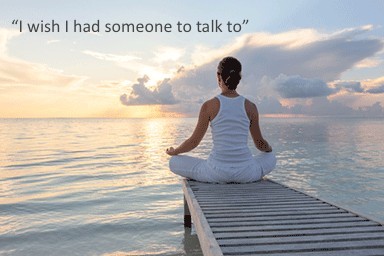Reduce anxiety or stress

Everyone feels anxious and stressed at times but sometimes these feelings can get out of control
- identify symptoms of stress and anxiety such as heart palpitations and panic
- help to distinguish between a normal stress reaction and something more serious
- explanation of treatment options including Thinkwell
With Dr Morton’s - the medical helpline© you can email or phone a real doctor at any time for more information, reassurance or advice
Modern life is stressful for most people
Stressful events come and go in our lives constantly and we generally cope well with them even if they make us feel anxious. Usually the event passes and the stress and anxiety melt away. This process helps us learn to accept and deal with stressful events rather than avoiding them.
Sometimes however, the stress just gets too much and makes us feel we can’t cope or as if we are 'going mad'. We begin to feel depressed, permanently anxious, or both, and it can also make us feel physically unwell. Symptoms can range from feeling something is sticking in your throat as you swallow (this is called globus hystericus), through heart palpitations (a racing or fluttering heart) through to an actual pain in the abdomen, or bowel upset. Poor sleep patterns lead to sleep deprivation and exhaustion, which in itself makes the problem worse. This unpleasant array of physical symptoms can be frightening in themselves as they often mimic symptoms of serious physical illnesses. The presence of these alarming physical symptoms in turn re-enforces the anxiety and so leads to a vicious circle of worsening anxiety leading to more physical symptoms. A good example of this is when anxiety triggers a 'panic attack'.
This can happen in an extreme way as a sort of 'nervous breakdown' where the sufferer becomes completely incapacitated and unable to function normally for a period of time.
It may be that anxiety and panic are triggered by a specific thing or circumstance. This is called a phobia. There are a wide range of phobias; some are completely incapacitating like a phobia of confined spaces (claustrophobia) making it impossible to go into a lift, or sometimes even into a small toilet; to jolly inconvenient ones like a needle phobia, so that even having a simple vaccination to be able to go travelling is near impossible.
We each have our own finite capacity for coping with stress and this is very variable between individuals. If we exceed our personal limit we will become unwell. This can happen as a result of a build-up of too many small stressful events or it can be the result of one huge stress which simply overwhelms us. Although anxiety is often a result of stress, anxiety symptoms can also appear for no obvious reason and be unrelated to an event or problem in your life. We call this free floating anxiety.
Many women develop anxiety at the time of the menopause and they may benefit from HRT. People who have experienced terrifying or deeply emotional life events may suffer from anxiety in the form of post-traumatic stress disorder. The type of event may range from battle field experiences to the traumatic delivery of a baby.
A nervous breakdown is when the stress and anxiety completely incapacitate the sufferer, who becomes unable to function normally for a period of time.
A person is more likely to suffer from anxiety if they have a close relative who suffers from it.
There are various treatments for anxiety, some involving talking and exploring the problem, and some involving medication.
Symptoms
- shaking
- sweating
- heart palpitations
- fear and anguish
- feeling restless
- nausea
- insomnia - usually difficulty getting off to sleep or frequent wakening in the night
- tiredness
- breathing problems
- difficulty concentrating
- irritability
- agoraphobia (fear of open spaces) or claustrophobia (fear of confined spaces)
Other conditions can give similar symptoms such as
- depression
- phobias including agoraphobia
- post traumatic stress disorder (PTSD)
- obsessive compulsive disorder (OCD)
- drug or alcohol misuse
- menopause or perimenopause
When should I contact the doctor?
If you are unable to get on with your day because of how you are feeling or would like someone you can trust to talk to about your fears or feelings. If you have physical symptoms a doctor will help you work out whether they may be caused by stress or anxiety, or whether they need investigating.
Available treatments?
Often talking your symptoms over with someone you trust is all that is needed. Dr Morton’s works with Thinkwell to provide this service.
Specific psychological therapies have been shown to be effective in treating anxiety, for example cognitive behavioural therapy (CBT) and neuro-linguistic programming (NLP).
Relaxation exercises and mindfulness can help but need to be practised consistently for weeks or months to be effective. Aerobic exercise is also beneficial.
CBT aims to help us challenge the so-called negative automatic thoughts (assumptions) we make, which lead to feeling anxious, and retrain ourselves to process information in a more helpful, positive way. In other words it's a way of silencing the unhelpful critical voice so many of us have in our heads and restoring a more realistic balance.
Medication can be useful and there are some antidepressants which also have a licence for the treatment of anxiety, for example sertraline (Lustral), citalopram (Cipramil) and escitalopram (Cipralex). Contrary to popular myth, these medicines are not thought to be addictive because they don't produce craving or tolerance. However they can produce withdrawal symptoms if they are stopped abruptly, so the dose should always be reduced gradually over weeks before stopping. They work for anxiety even without depression and because anxiety and depression often co-exist, they are very useful. Buspirone (Buspar) is not much used nowadays because it doesn't work very well. It has largely been replaced by pregabalin (Lyrica) a drug which is also used to treat epilepsy and chronic pain, although it is expensive.
Diazepam can be used for short-term relief of anxiety but it is addictive and causes drowsiness which is why these days it is used far less often than in the past, but can be useful to relieve anxiety before a specific event such as flying.
Medicines called beta blockers are also prescribed for anxiety and can be particularly useful for people who have performance anxiety - for example when speaking or performing in public. It does not pass into the brain so although it is helpful for physical symptoms (for example shaking, palpitations and sweating) it doesn't help with anxious ruminations.
Please be aware that Dr Morton’s - the medical helpline© is unable to prescribe Diazepam or related medication. If indicated, you will need to get this from your GP.
Related topics
- anxiety in teenagers
- relieve depression
- cope with bereavement or sadness
- menopause does not have to be like this
- nervous breakdown
- anxiety and physical symptoms
- stress-related tiredness

